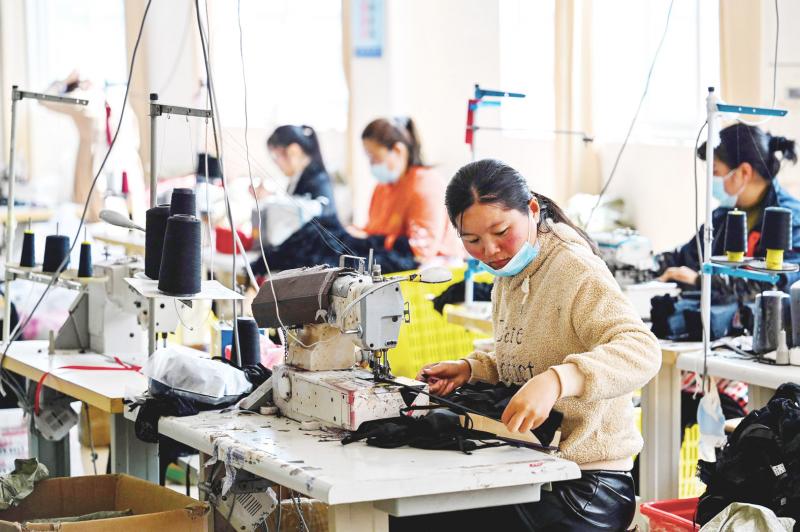Americans like their lingerie to be risque, Europeans prefer it classier, and Chinese remain a bit shy, but are opening up — but the biggest order of all came from North Korea.
So goes the street-corner discussion in Guanyun, a coastal county that for generations followed the rhythms of wheat and rice cultivation, but today concerns itself with global lingerie preferences.
The flat farming region between Beijing and Shanghai is China’s self-proclaimed “Lingerie Capital,” where sewing machines hum in village micro-factories to meet up to 70 percent of the fast-growing domestic demand.

Photo: AFP
Millions more items are exported annually in a textbook example of the ability of Internet-enabled Chinese entrepreneurs to profit from even the most off-the-wall idea.
The man widely credited with lighting the spark is Lei Congrui, a lanky 30-year-old with a ponytail and cap who would look at home on a skateboard. It all happened almost by accident.
As a teenager 15 years ago, Lei began making extra cash by hawking various consumer goods on the country’s growing e-commerce sites.

Photo: AFP
“Customers kept asking if we have any lingerie. I had never heard of it before, but I just said: ‘Yes,’ and then looked up what it was,” he said.
Lei “figured out a way” and now employs more than 100 workers who push lacy black and red panties, and bustiers through stitching machines.
His brands, such as “Midnight Charm,” pull in more than US$1.5 million in annual revenue, he said.
The success of early movers such as Lei inspired an industrial revolution.
The Guanyun Provincial Government said that there are more than 500 factories employing tens of thousands, and churning out more than US$300 million of lingerie annually.
Loosening Chinese sexual attitudes made it all possible.
Communism left a prevailing legacy of modesty. Pornography is banned and authorities launch periodic crackdowns on anything deemed “vulgar.”
However, prolonged exposure to more open foreign attitudes is liberating a younger generation, especially women.
Market consultancy iiMedia said that Chinese online sales of sex-related products grew 50 percent in 2019 to US$7 billion. It predicted 35 percent growth last year, despite fallout from the COVID-19 pandemic.
“Attitudes of the young are catching up and bringing sensuality into the home. [Lingerie] is becoming popular,” said Li Yue, a local lingerie factory worker.
When Lei first started, most buyers were more than 30, and many had lived abroad or had some other exposure to foreign ways.
However, by about 2013, volumes jumped as a younger generation of Chinese consumers began discovering their sensuality, Lei said, adding that most buyers are now aged 22 to 25.
Initially, loose-fitting, not-too-revealing designs were favored in China, but today, semi-transparent, “body-hugging” numbers dominate.
Guanyun’s industrial reinvention did not happen overnight. Early pioneers found it difficult to hire squeamish local staff.
“When they first came in contact with these things, they didn’t quite understand,” said Chang Kailin, 58, who runs a factory and is Lei’s uncle. “But after the industry got bigger and stronger, people could make money and shake off poverty. Now everyone loves it.”
Lei exports 90 percent of his output, mostly to the US and Europe. Significant volumes also go to South America, where sales indicate role-playing costumes rule the bedroom.
Middle Eastern buyers — favoring longer, more modest items — are also surprisingly active, as are Africans, who like a splash of color. Southeast Asia is growing fast as well.
However, Lei’s biggest single order — worth US$1 million — came from a mysterious North Korean buyer in 2012, but the customer abruptly backed out without explanation and the merchandise was sold elsewhere.
Lingerie has transformed Guanyun, with factories sprouting up next to wheat fields, and newfound wealth displayed in new homes and vehicles.
Previously, many of the county’s about 1 million inhabitants left for the hard life of a migrant worker in far-off factories.
No more, said Li, the garment worker.
“Working away from home, you get homesick,” the mother of two said. “These companies allow us to come home to work. It’s not easy out there.”
Guanyun has broken ground on a US$500 million, 690-hectare lingerie-themed industrial zone that is to “integrate research and development and design, fabric accessories, e-commerce operations, warehousing and logistics.”
Pandemic lockdowns last year hit output. It has since roared back, but demand remains tepid in overseas markets still struggling with COVID-19, while home-bound consumers are concentrating spending on basic household necessities, Lei said.
“After these problems are solved,” he said, smiling. “They will be ready to play again.”

A French-Algerian man went on trial in France on Monday for burning to death his wife in 2021, a case that shocked the public and sparked heavy criticism of police for failing to take adequate measures to protect her. Mounir Boutaa, now 48, stalked his Algerian-born wife Chahinez Daoud following their separation, and even bought a van he parked outside her house near Bordeaux in southwestern France, which he used to watch her without being detected. On May 4, 2021, he attacked her in the street, shot her in both legs, poured gasoline on her and set her on fire. A neighbor hearing

DEATH CONSTANTLY LOOMING: Decades of detention took a major toll on Iwao Hakamada’s mental health, his lawyers describing him as ‘living in a world of fantasy’ A Japanese man wrongly convicted of murder who was the world’s longest-serving death row inmate has been awarded US$1.44 million in compensation, an official said yesterday. The payout represents ¥12,500 (US$83) for each day of the more than four decades that Iwao Hakamada spent in detention, most of it on death row when each day could have been his last. It is a record for compensation of this kind, Japanese media said. The former boxer, now 89, was exonerated last year of a 1966 quadruple murder after a tireless campaign by his sister and others. The case sparked scrutiny of the justice system in

DITCH TACTICS: Kenyan officers were on their way to rescue Haitian police stuck in a ditch suspected to have been deliberately dug by Haitian gang members A Kenyan policeman deployed in Haiti has gone missing after violent gangs attacked a group of officers on a rescue mission, a UN-backed multinational security mission said in a statement yesterday. The Kenyan officers on Tuesday were on their way to rescue Haitian police stuck in a ditch “suspected to have been deliberately dug by gangs,” the statement said, adding that “specialized teams have been deployed” to search for the missing officer. Local media outlets in Haiti reported that the officer had been killed and videos of a lifeless man clothed in Kenyan uniform were shared on social media. Gang violence has left

US Vice President J.D. Vance on Friday accused Denmark of not having done enough to protect Greenland, when he visited the strategically placed and resource-rich Danish territory coveted by US President Donald Trump. Vance made his comment during a trip to the Pituffik Space Base in northwestern Greenland, a visit viewed by Copenhagen and Nuuk as a provocation. “Our message to Denmark is very simple: You have not done a good job by the people of Greenland,” Vance told a news conference. “You have under-invested in the people of Greenland, and you have under-invested in the security architecture of this